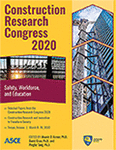Construction Research Congress 2020
Enhancing Virtual Site Visits via Bi-Directional Coordination between Construction Sites and Classrooms
Publication: Construction Research Congress 2020: Safety, Workforce, and Education
ABSTRACT
Several studies have provided empirical evidence that providing learners with field experiences can enhance the contextual understanding of the relationships between theory and practice. Site visits have the potential of stimulating students’ interest in the domain knowledge and skills, while also enhancing their professional development. For students pursuing careers in the construction industry, one way of gaining field experience has been by physically observing the construction process and engaging with the site personnel. Such experiences are particularly beneficial as industry practitioners are constantly devising innovative methods and practices of delivering safer, quicker, and more sustainable projects, which students can learn from. However, it is usually difficult to provide these experiences due to cost, safety, weather, and schedule constraints, and the inability of the project sites to accommodate large class sizes. Even when access to construction sites is granted, the following concerns still exist: the educational quality of the site visit is highly dependent on the activities that are occurring on the day of the visit; students with disabilities have difficulty navigating the job sites; and there are limited opportunities for students to engage with field personnel. This paper describes a specific effort that seeks to facilitate real-time bi-directional communication/interaction between field personnel on the construction site, and students and instructors in the classroom. It argues for the effective integration of computational resources, such as unmanned aerial systems, mixed reality, and eye-tracking, with construction engineering education, and outlines how bi-directional coordination can be maintained between the construction site and the classroom. The opportunity offered by the adoption of these computational resources to make the construction field experience more accessible is discussed and the key benefits highlighted.
Get full access to this article
View all available purchase options and get full access to this chapter.
REFERENCES
Azhar, S., Kim, J., & Salman, A. Implementing Virtual Reality and Mixed Reality Technologies in Construction Education: Students ‘perceptions and Lessons Learned.
Chorney, D. W. J. P., & Journal, H. E. (2006). Teacher development and the role of reflection. 72(3), 22.
D’Mello, S., Lehman, B., Pekrun, R., & Graesser, A. (2014). Confusion can be beneficial for learning. Learning and Instruction, 29, 153-170.
Eraut, M. (2000). Non-formal learning and tacit knowledge in professional work. British journal of educational psychology, 70(1), 113-136.
Gainsburg, J., Rodriguez-Lluesma, C., & Bailey, D. E. (2010). A “knowledge profile” of an engineering occupation: temporal patterns in the use of engineering knowledge. Engineering Studies, 2(3), 197-219.
Goodwin, C. (1994). Professional vision. American anthropologist, 96(3), 606-633.
Goodwin, C. (1995). Seeing in depth. Social studies of science, 25(2), 237-274.
Jaselskis, E., Ruwanpura, J., Becker, T., Silva, L., Jewell, P., Floyd, E. J. J. o. C. E., & Management. (2010). Innovation in construction engineering education using two applications of internet-based information technology to provide real-time project observations. 137(10), 829-835.
Johri, A., & Olds, B. M. (2011). Situated engineering learning: Bridging engineering education research and the learning sciences. Journal of engineering Education, 100(1), 151-185.
Jones, B. D. (2009). Motivating students to engage in learning: The MUSIC model of academic motivation. International Journal of Teaching and Learning in Higher Education, 21(2), 272-285.
Kajewski, S. (1999). Virtual construction site visits via the world wide web. Paper presented at the Australian University Building Educators Association Conference. Proceeding of the 3rd and 4th electronic conference.
Kim, J., & Leathem, T. Virtual Reality as a Standard in the Construction Management Curriculum.
Kort, B., Reilly, R., & Picard, R. W. (2001). An affective model of interplay between emotions and learning: Reengineering educational pedagogy-building a learning companion. Paper presented at the Proceedings IEEE International Conference on Advanced Learning Technologies.
Lave, J., & Wenger, E. (1991). Situated learning: Legitimate peripheral participation: Cambridge university press.
Mills, A., Ashford, P., & McLaughlin, P. (2006). The value of experiential learning for providing a contextual understanding of the construction process. Paper presented at the AUBEA 2006: Proceedings of the 31st Australasian University Building Educators Association Conference.
Pupil-Labs. (2019). Retrieved from https://pupil-labs.com
Shanbari, H., Blinn, N., & Issa, R. (2016). Using augmented reality video in enhancing masonry and roof component comprehension for construction management students. Engineering, Construction Architectural Management, 23(6), 765-781.
Stevens, R., & Hall, R. (1998). Disciplined perception: Learning to see in technoscience. Talking mathematics in school: Studies of teaching and learning, 107-149.
VIVE. (2018). HTC Vive. Retrieved from https://www.vive.com/us/product/vive-virtual-reality-system/
Wenger, E. (1998). Communities of practice: Learning as a social system. Systems thinker, 9(5), 2-3.
Information & Authors
Information
Published In
Construction Research Congress 2020: Safety, Workforce, and Education
Pages: 829 - 837
Editors: Mounir El Asmar, Ph.D., Arizona State University, David Grau, Ph.D., Arizona State University, and Pingbo Tang, Ph.D., Arizona State University
ISBN (Online): 978-0-7844-8287-2
Copyright
© 2020 American Society of Civil Engineers.
History
Published online: Nov 9, 2020
Published in print: Nov 9, 2020
Authors
Metrics & Citations
Metrics
Citations
Download citation
If you have the appropriate software installed, you can download article citation data to the citation manager of your choice. Simply select your manager software from the list below and click Download.
